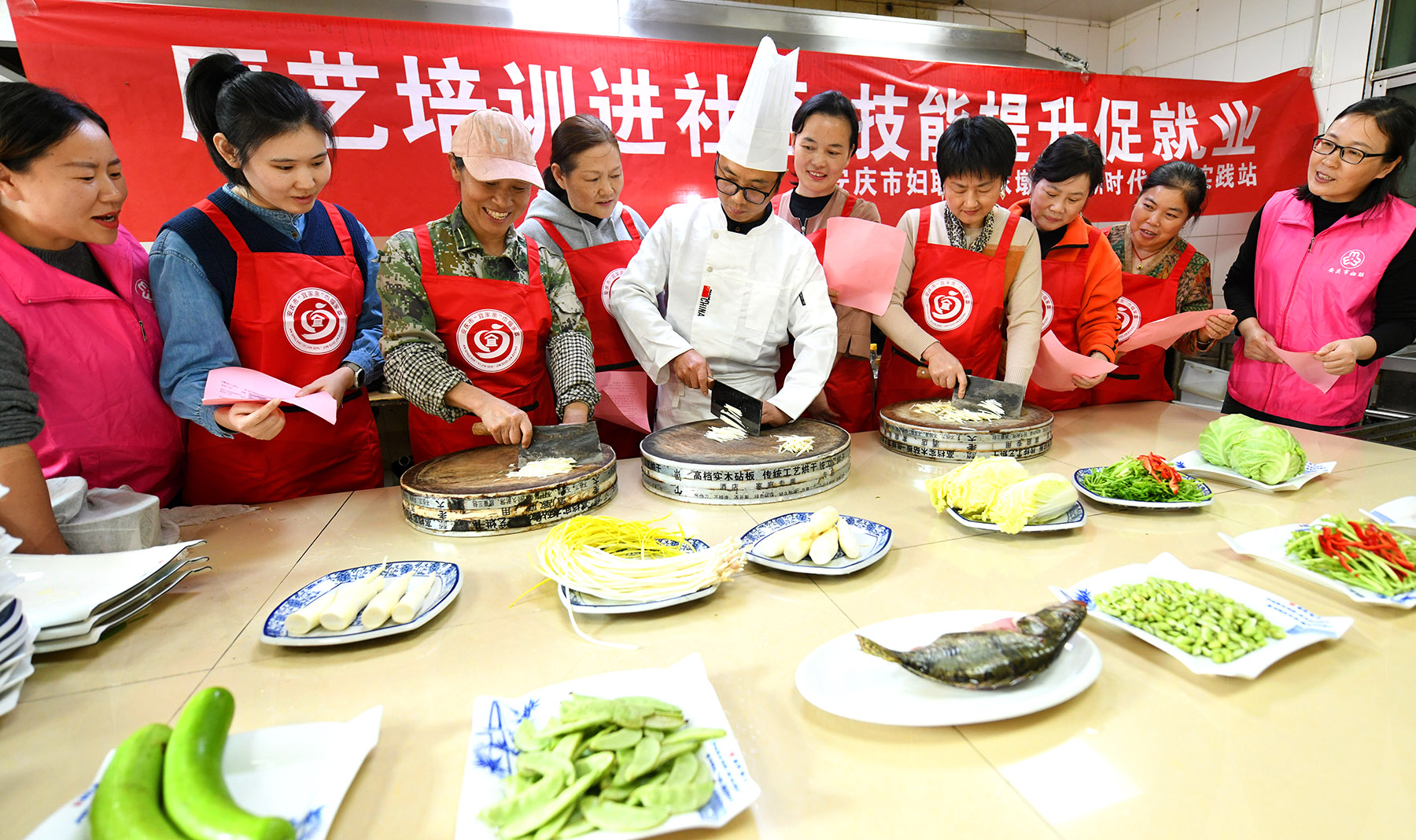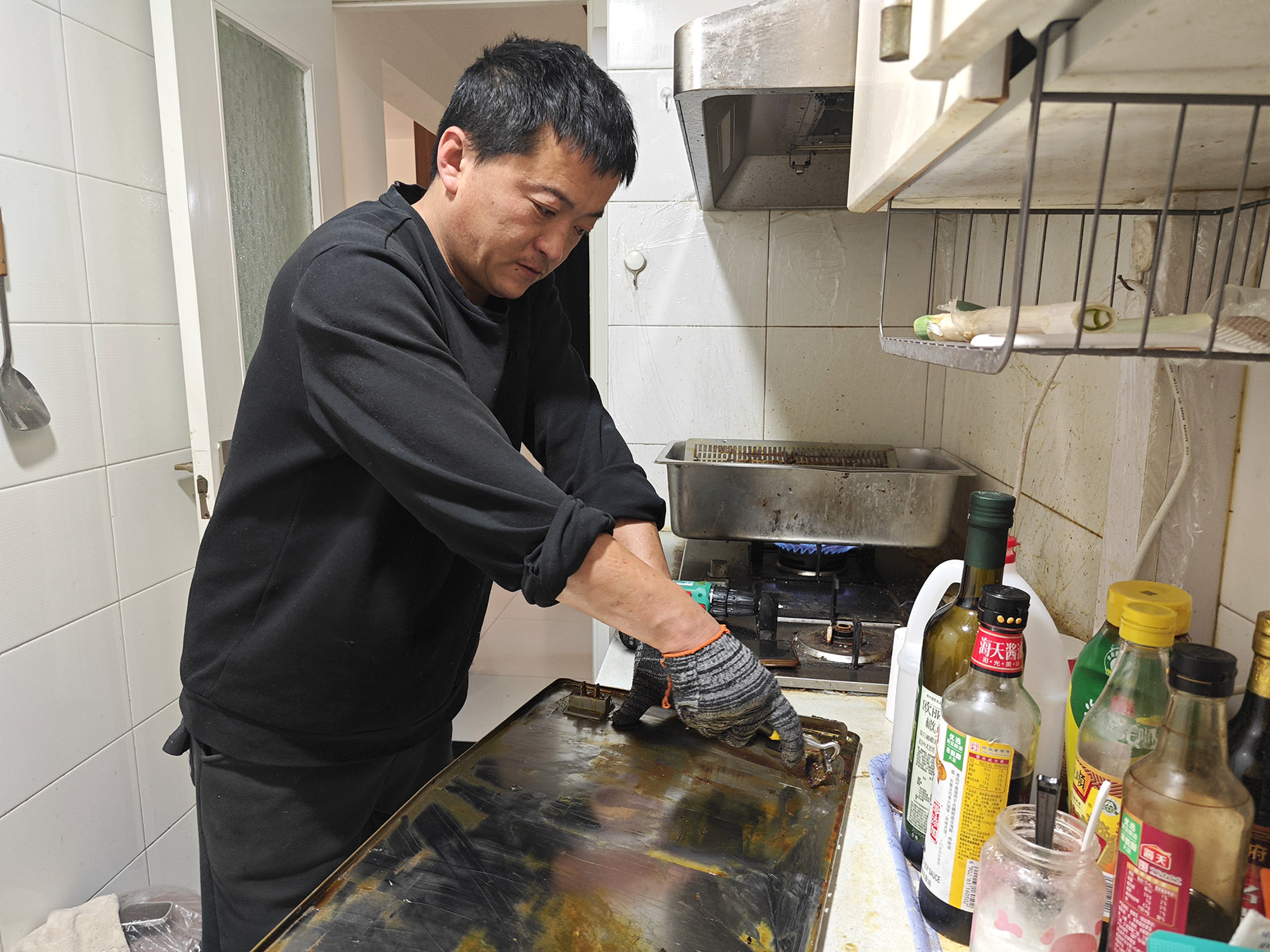Household industry scrubs up driven by fast-growing demand

Chinese people have a tradition of thoroughly cleaning their homes before Spring Festival to sweep away bad luck and welcome good fortune.
Since the word "dust" sounds similar to the word "old" in Mandarin, removing dust and trash symbolically sweeps away the old to usher in the new.
In recent years, many households have chosen to "outsource" such pre-festival home cleaning. According to 58 Daojia, a home services company, there has been a surge in demand for house cleaning services before Spring Festival. As of December 2024, the number of orders for comprehensive house cleaning services increased by 178 percent month-on-month, window cleaning orders surged by 2.7 times, and kitchen hood cleaning orders rose by 109 percent.
The rising demand for short-term house cleaning services is indicative of the rapid growth of the home services industry. Li Chao, a spokesperson for the National Development and Reform Commission, said at a news conference that the market size of China's household services industry has exceeded one trillion yuan ($136.5 billion), with over 30 million professionals working in the industry. But even that is not enough to meet the demand.
"As demand for elderly care and childcare continues to rise, it is estimated that there is a shortage of over 20 million household service professionals, particularly high-quality personnel with professional knowledge and skills," she said.
At the same time as the demand has soared, people have increasingly diverse and specific needs. For instance, the demand for pet-sitting services has increased by 2.7 times, that for home chefs by 11.6 times, the cleaning of rented houses by 3.3 times, and Japanese-style moving and organizing services by 1.3 times, according to the 2024 service experience report by 58 Daojia.
"Paying for services that bring happiness and joy has become a new consumption trend among the quality-oriented Generation Z, which has fueled the development of the on-demand economy," the home services company said in its report.
Changes in customer demand have spurred home services personnel to engage in training programs to enhance their professional knowledge and skills so they can offer a better service and gain a competitive edge in the market.

Mastering skills
Liu Ping, 43, is delighted to have completed a training program for mother-and-child care and to have received an "Excellent Trainee" award from a home services company in Beijing.
Liu closed her clothing store three years ago due to poor business. Believing that home services held the most promising prospects, she switched careers and entered the industry.
"Every household has elderly members and children, and people are busy with work and have little time to take care of them. Therefore, the demand for elderly care and childcare is always there," she said.
Initially, Liu provided what she called "not-so-professional" home services to two households, such as preparing complementary foods for infants, offering early childhood education, and doing some simple chores. However, she soon realized she needed to enhance her knowledge and skills to better meet customers' expectations.
READ MORE: Caring hands help seniors take the plunge
"Parents now have stricter requirements for childcare. During job interviews, employers look at how many qualifications and certificates you have, what skills you possess, how much experience you have, whether you can drive, speak English, and so on," she said.
Recognizing the gap between her abilities and customer expectations, Liu decided to take professional training courses, which she believes will be beneficial for future job opportunities and earning customer trust. She enrolled in a training program offered by a large home services company and embarked on a one-month intensive course that included theoretical lessons and practical exercises.
"The courses I registered for included postpartum recovery, pediatric massage, lactation stimulation, as well as infant care, all taught by experienced professionals in maternal and child care. The overall training lasted about a month," Liu said.

What left the deepest impression on Liu was a lesson on infant care, where the teacher demonstrated multiple safe and comfortable ways to hold a baby. "In the past, we used to hold babies in just one position, but now I've learned that there are multiple positions that are comfortable and safe for the baby."
To complete the training program, Liu and her peers had to pass a practical exam. "The exam is very rigorous and detailed. For example, in the postpartum rehabilitation exam, we needed to describe the procedures for head care, waist care, uterine care, ovarian care, and identify the acupressure points when massaging the mothers," she recalled.
Armed with more professional skills, Liu now feels confident in her career prospects: "With my growing experience and improved skills, earning over 10,000 yuan per month is achievable."
Liu's story is an example of the trend of home services workers becoming more professional through training. Data from 58 Daojia shows that in 2024, the number of home services personnel participating in training programs increased by 196 percent compared to the previous year. Home services companies are providing standardized and specialized training, while also developing new courses such as child development companions, medical companions, and elite housekeepers.
Training and employment are closely connected. After passing assessments and obtaining certificates, workers can more efficiently match with employers and receive orders on online platforms. Some even begin their in-home services the day after they complete training.
More than 70 percent of trainees see an increase in salary after training, with a salary boost of up to 41 percent for employees in second-tier cities and below, according to the report.

Nurturing success
Ning Erjian, head of the home services sector at a company in Shenzhen, Guangdong province, wrapped up his Spring Festival holiday early this year and has already returned to work to process a large influx of orders.
Nine years ago, Ning was admitted to the home economics major at Jilin Agricultural University in Northeastern Jilin province. Like most of his classmates, this major was not his first choice.
"I had never heard of home economics back then, but after researching online and discovering the country's increasing focus on the home services industry, I decided to pursue it," the 27-year-old recalled.
Wu Ying, dean of the School of Home Economics at Jilin Agricultural University, explained that the university established China's first undergraduate program in home economics in 2003, foreseeing that the home services industry would prosper as the country placed more emphasis on people's welfare.
"Although the home services market was not very prosperous at that time and our program faced challenges in student employment and internships, we believed that one of a university's missions is to cultivate talent for emerging industries, so we persisted," she said.
As a pioneer in home economics, the school offers more than 40 courses, including core subjects such as family nursing, family nutrition, family psychology, and home economics industry services and management. Students also take optional courses such as home design, flower arrangement and tea art.
"We are committed to nurturing talent that meets the increasingly diverse and specialized market demand. In addition to theoretical courses, students are required to complete practical assignments, such as conducting cognitive assessments of the elderly. We also mandate internships at nursing homes, home services companies, and training institutes," Wu said.

"During the summer vacation of 2019, I interned at a domestic services company in Nanjing through a teacher's recommendation. This experience helped me gain an in-depth understanding of how home services companies operate, which sparked my interest in the industry. After graduation, I joined my current company," Ning said.
"I think my biggest achievement during college was improving my knowledge and skills in domestic service, developing teamwork and communication abilities, and cultivating the habit of thinking independently and creatively," he added.
"Our graduates have two main career pathways: one is to become training instructors for home services enterprises and vocational school teachers, while the other is to enter management positions at home services companies," Wu said.
With an annual graduate employment rate exceeding 95 percent, the university has seen a surge in students choosing home economics as their first major.
Currently, Ning is busy recruiting sales and home services personnel, developing standardized work processes, training sales teams and service workers, and providing quality services to customers. As a manager, he also conducts regular follow-up visits to learn about customers' needs to optimize the user experience.
After graduating, Ning earned a monthly salary of 6,000 yuan with commission. Six months later, his income exceeded 10,000 yuan, and after a year, he secured a management position.
"I feel very fortunate that I enrolled in this major. Otherwise, it would be difficult for a graduate from an ordinary university to have the income and position I have now," he said.

Promoting synergy
Reflecting on the home services industry, Ning acknowledges that despite its rapid development, challenges remain: a lack of universal standards, disorganized competition such as price wars, and unprotected rights for consumers and service providers are hindering the industry's healthy growth.
To tackle these problems, localities are pooling resources and accelerating industrial transformation through technology.
Zheng Baolan, president of the Shanxi Province Domestic Service Association, recalled meeting a middle-aged couple at a local hospital who had undergone gastroscopies and had polyps removed from their stomachs.
"Unwilling to burden their child, who lives in another city, they found themselves with no one to care for them after the surgery," Zheng said.
Zheng recommended the Sanjin Smart Home Services mini-app that connects users with medical companions and caregivers.
"This online platform is indispensable. I believe it will become as popular as Alipay in the future," she observed.
ALSO READ: Measures to boost service consumption
In December, the Shanxi Domestic Services Association launched Sanjin Smart Home Services, providing an online platform to connect consumers, domestic services companies, and workers. The platform allows consumers to place orders and choose caregivers based on qualifications, experience, medical reports, and service evaluations.
It also offers online training courses and rights protection channels for services personnel, making it easier for them to improve their skills and safeguard their rights.
"We've invited 60 influential home services companies in Shanxi to join the platform, hoping to transform the traditional C-to-C business model and ensure high-quality services for consumers," Zheng said.
The Shanxi Home Services Association is also exploring new ways to integrate business and education. Zheng revealed that the association is discussing a partnership with Shanxi Technology and Business University to establish a home services industry incubator on campus.
"Students in home economics can become managers of online service shops, learning about the business with the assistance of the internet, big data, and artificial intelligence technologies," she said.
Xu Nuo contributed to this story.


